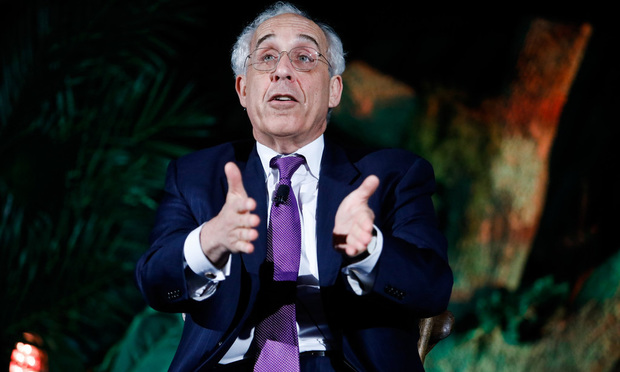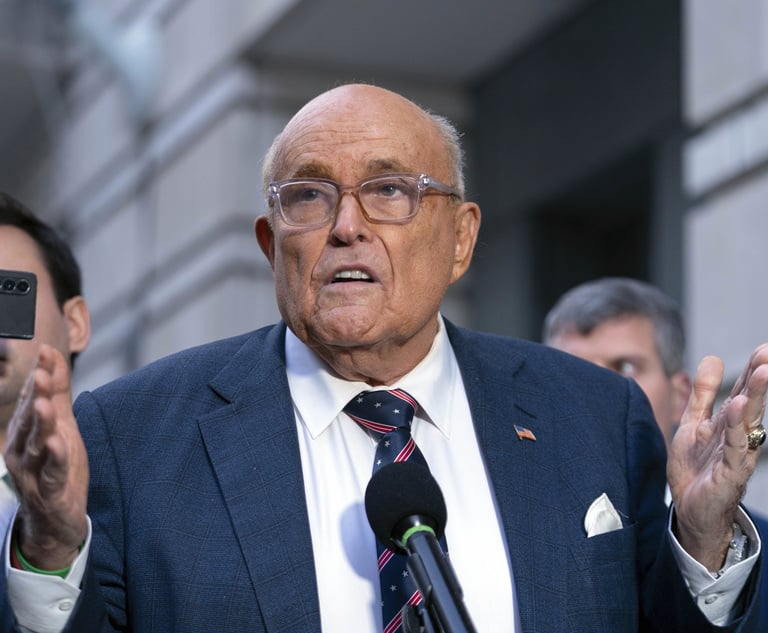Mayer Brown Leads Legal Fight Against Trump's Executive Order Targeting Social Media Companies
The lawsuit claims the president's order violates the free speech protections of social media companies and its users.
June 02, 2020 at 07:10 PM
3 minute read
The original version of this story was published on National Law Journal
 Mayer Brown's Andrew Pincus, speaking at the 18th Annual Legal Reform Summit, held at the U.S. Chamber of Commerce in Washington. Photo: Diego M. Radzinschi/ ALM.
Mayer Brown's Andrew Pincus, speaking at the 18th Annual Legal Reform Summit, held at the U.S. Chamber of Commerce in Washington. Photo: Diego M. Radzinschi/ ALM.
The Center for Democracy and Technology has sued President Donald Trump over an executive order seeking to crack down on social media companies' "selective censorship" after Twitter flagged one of the president's posts as potentially misleading.
Mayer Brown is representing the Washington, D.C.-based tech policy nonprofit in one of the first legal challenges to the executive order delegating several agencies to review Section 230, a provision within the Communications Decency Act shielding online companies from liability for user-generated content.
The complaint, filed Tuesday in the U.S. District Court for the District of Columbia, alleges that the order violates the free speech protections of social media companies and its users, and seeks a preliminary and permanent injunction enjoining the Trump administration from enforcing the order.
The center's incoming general counsel, Avery Gardiner, who filed the complaint alongside a Mayer Brown team led by Andrew Pincus in Washington, D.C., said, "The main goal of the suit is to defend basic First Amendment freedoms for all of us. What this executive order does is threaten all of our rights to speak freely online."
Gardiner said she expects to see more challenges from public interest-oriented groups across the political spectrum, as well as some companies pushing back against the restrictions.
The order came shortly after Twitter fact-checked a post from the president claiming that mail-in ballots would lead to voter fraud.
Gardiner said that in these "incredibly difficult times," referring to the national protests over the death of George Floyd, the group worries about any online affront to free speech, but that the president threatening the ability of social media platforms to moderate speech about elections is "mind-blowingly terrifying and needs to stop."
"It's not just about what he's trying to do against Twitter," she said. "He is not just sending a shot across the bow, but a shot into the hull of any online platform that accepts user-generated content."
The order enlists the U.S. attorney general to form a working group of state attorneys general to review current state statutes that could enforce prohibitions on online content moderation and propose federal legislation. The presidential action also seeks to begin a Federal Communications Commission rulemaking process to propose regulations clarifying Section 230. Both procedures would likely not have an immediate effect on online free speech.
"The order says very, very loudly that if you speak in ways that I don't like, I will find a way to make your life painful, and that's a very damaging message, even if some of the specific effects of the order don't come into effect for a period of time," she said.
A White House representative did not respond to a request for comment Tuesday afternoon.
Read more:
'Unlawful and Unenforceable': Legal Experts Deride Trump's Attempt to Target Social Media Companies
Wilmer, Dechert Among Firms Awarded $6.8M in Texas Voter ID Litigation
Federal Lawsuit Challenges Mail-In Ballot Rules Amid Pandemic
This content has been archived. It is available through our partners, LexisNexis® and Bloomberg Law.
To view this content, please continue to their sites.
Not a Lexis Subscriber?
Subscribe Now
Not a Bloomberg Law Subscriber?
Subscribe Now
NOT FOR REPRINT
© 2025 ALM Global, LLC, All Rights Reserved. Request academic re-use from www.copyright.com. All other uses, submit a request to [email protected]. For more information visit Asset & Logo Licensing.
You Might Like
View All
Litigators of the Week: A $630M Antitrust Settlement for Automotive Software Vendors—$140M More Than Alleged Overcharges

A Second Straight Year of Increased Securities Filings—With Perhaps More on the Horizon
Law Firms Mentioned
Trending Stories
- 1Uber Files RICO Suit Against Plaintiff-Side Firms Alleging Fraudulent Injury Claims
- 2The Law Firm Disrupted: Scrutinizing the Elephant More Than the Mouse
- 3Inherent Diminished Value Damages Unavailable to 3rd-Party Claimants, Court Says
- 4Pa. Defense Firm Sued by Client Over Ex-Eagles Player's $43.5M Med Mal Win
- 5Losses Mount at Morris Manning, but Departing Ex-Chair Stays Bullish About His Old Firm's Future
Who Got The Work
J. Brugh Lower of Gibbons has entered an appearance for industrial equipment supplier Devco Corporation in a pending trademark infringement lawsuit. The suit, accusing the defendant of selling knock-off Graco products, was filed Dec. 18 in New Jersey District Court by Rivkin Radler on behalf of Graco Inc. and Graco Minnesota. The case, assigned to U.S. District Judge Zahid N. Quraishi, is 3:24-cv-11294, Graco Inc. et al v. Devco Corporation.
Who Got The Work
Rebecca Maller-Stein and Kent A. Yalowitz of Arnold & Porter Kaye Scholer have entered their appearances for Hanaco Venture Capital and its executives, Lior Prosor and David Frankel, in a pending securities lawsuit. The action, filed on Dec. 24 in New York Southern District Court by Zell, Aron & Co. on behalf of Goldeneye Advisors, accuses the defendants of negligently and fraudulently managing the plaintiff's $1 million investment. The case, assigned to U.S. District Judge Vernon S. Broderick, is 1:24-cv-09918, Goldeneye Advisors, LLC v. Hanaco Venture Capital, Ltd. et al.
Who Got The Work
Attorneys from A&O Shearman has stepped in as defense counsel for Toronto-Dominion Bank and other defendants in a pending securities class action. The suit, filed Dec. 11 in New York Southern District Court by Bleichmar Fonti & Auld, accuses the defendants of concealing the bank's 'pervasive' deficiencies in regards to its compliance with the Bank Secrecy Act and the quality of its anti-money laundering controls. The case, assigned to U.S. District Judge Arun Subramanian, is 1:24-cv-09445, Gonzalez v. The Toronto-Dominion Bank et al.
Who Got The Work
Crown Castle International, a Pennsylvania company providing shared communications infrastructure, has turned to Luke D. Wolf of Gordon Rees Scully Mansukhani to fend off a pending breach-of-contract lawsuit. The court action, filed Nov. 25 in Michigan Eastern District Court by Hooper Hathaway PC on behalf of The Town Residences LLC, accuses Crown Castle of failing to transfer approximately $30,000 in utility payments from T-Mobile in breach of a roof-top lease and assignment agreement. The case, assigned to U.S. District Judge Susan K. Declercq, is 2:24-cv-13131, The Town Residences LLC v. T-Mobile US, Inc. et al.
Who Got The Work
Wilfred P. Coronato and Daniel M. Schwartz of McCarter & English have stepped in as defense counsel to Electrolux Home Products Inc. in a pending product liability lawsuit. The court action, filed Nov. 26 in New York Eastern District Court by Poulos Lopiccolo PC and Nagel Rice LLP on behalf of David Stern, alleges that the defendant's refrigerators’ drawers and shelving repeatedly break and fall apart within months after purchase. The case, assigned to U.S. District Judge Joan M. Azrack, is 2:24-cv-08204, Stern v. Electrolux Home Products, Inc.
Featured Firms
Law Offices of Gary Martin Hays & Associates, P.C.
(470) 294-1674
Law Offices of Mark E. Salomone
(857) 444-6468
Smith & Hassler
(713) 739-1250








